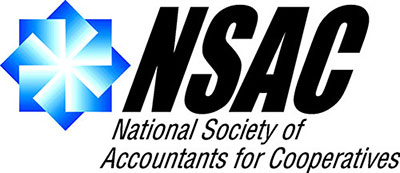 NCBA CLUSA associate member National Society of Accountants for Cooperatives (NSAC) offers accounting, auditing, tax and business education uniquely tailored for the financial management of cooperatives. Ahead of the professional society’s July 18 webinar on ethics and compliance, NSAC sent this thought leadership article:
NCBA CLUSA associate member National Society of Accountants for Cooperatives (NSAC) offers accounting, auditing, tax and business education uniquely tailored for the financial management of cooperatives. Ahead of the professional society’s July 18 webinar on ethics and compliance, NSAC sent this thought leadership article:
Cooperatives in various forms have been part of the human experience since the beginning of man. The modern cooperative structure is linked to a group of pioneers that created the Rochdale Society in 19th century England. The Rochdale originators developed seven principles for a cooperative, including but not limited to: voting, membership, equity, dividends, limited risk and more. The seven Rochdale principles imply integrity in the treatment of the member; however, it did not address the accuracy of the transactions.
The first settlers to the United States brought with them cooperative models. The Pilgrims on the Mayflower signed the Mayflower Compact, which served as an organizational document that had characteristics of a cooperative. Ben Franklin created one of the first cooperatives in the U.S. in 1736 when he created a mutual fire association, or a cooperative. As early as 1810, the first known U.S. dairy cooperative was formed in Connecticut to provide a service to its members.
Not all of the early cooperatives in the U.S. and other countries survived, as many of these businesses were poorly managed. Even though a significant number in the U.S. did disband, the cooperative concept did not go away; it was simply improved upon. As early as the mid‐1800s, various U.S. states and the Federal Government enacted laws both supporting and regulating cooperatives.
A critical point in validating cooperatives occurred when the U.S. Federal Government enacted the Capper‐Volstead Act in 1922, which most professionals now recognize as the “Cooperative Bill of Rights.” The focus of this act provided a limited exemption on anti‐trust provisions whereby producers (competitors) can come together in a business environment to process and market their products.
After World War II, the cooperative model expanded into numerous economic sectors as the number of agricultural cooperatives declined due to consolidation. Credit Unions, Insurance, Rural Electric Utilities, Grocery, Phone, and other sectors used the cooperative model to provide products and services their respective members otherwise would not have.
In 1935, the National Society of Accountants for Cooperatives (NSAC) was formed in the wake of regulatory and tax provisions in the U.S. that created oversight into the financial record keeping of cooperatives. The realization in 1935 of the need for expert information, education and networking for those responsible for the financial reporting and protecting the shareholders of a cooperative is just as necessary in 2014 as it was in 1935.
The complexity of the modern‐day cooperative, including member‐owned and investor‐owned businesses, LLCs, ESOPs, captive and shared insurances and other ownership structures, has changed considerably from the humble beginnings of that cooperative formed by a group of dairymen from Connecticut. The NSAC of today is helping to inform, educate and promote networking among Accountants and other Financial Professionals as they record, report and/or audit millions—if not billions—of dollars in domestic and international transactions.
Often business pursuits are way ahead of the regulatory environment in which they function. NSAC encourages members to engage in professional practices that are above reproach, that meet or exceed the standard required and, where no standard exists, we encourage an ethical approach to accuracy and transparency where necessary.
Those involved in the financial management of the modern cooperative face complex challenges like never before, including legislative compliance and the proper application of GAAP accounting principles. The history of the cooperative model has taught us that the ethical dealings within the cooperative are critical to the long term success of the enterprise. Adhering to ethical standards and following a strong compliance guideline will do much to ensure the financial legacy of the cooperative model for tomorrow.


